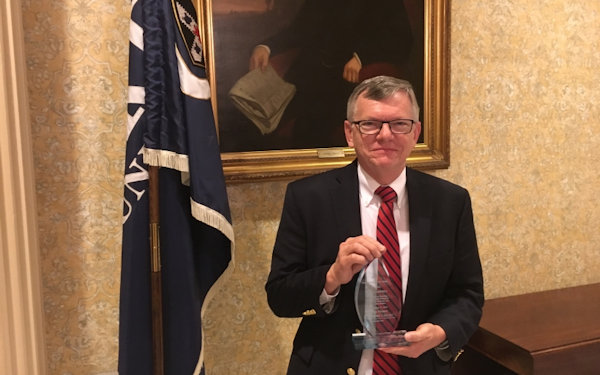Two laywomen from Michigan were on hand in Madison, NJ when church historians gathered.
The celebration of Dr. Ted Campbell as the 2016 recipient of its Distinguished Service Award, organizing the Commission for the 2017-20 quadrennium, the induction of new board members, and a blessing for Bishop Jeremiah Park as he set off on a special mission to Mongolia were highlights of the General Commission Archives and History’s first board meeting for the new four year cycle. The meeting was held September 16-19 at the United Methodist Archives and History Center on the Drew University campus in Madison, New Jersey.
As the first order of business, Rev. Alfred T. Day, General Secretary, spoke about the Commission’s mandate as The United Methodist Church’s “ministry of memory.” Drawing on an image from the Lorraine Hansberry play, “A Raisin In the Sun,” Day described a scene where the remembrance of family history changed the arc of the story, moving the characters from defeated resignation to embracing a new future, risks and all. The work of The General Commission on Archives and History is just like that, Day said.
“Memory in the Commission’s work is not meant in the passive but the active tense. Our “promoting and caring” for the historical interests of the UMC and its antecedents is vital, engaging, difference-making memory. It’s almost like anamnesis at the Lord’s Supper! It is impactful. Transformational. Causing our hearts and minds to burn within us,” Day exclaimed.

The GCAH Board consists of the 24 members with Bishop Park serving as President of the Board. Other officers include Drs. Judit Lakatos (Central Europe), William Bobby McClain (NEJ), Vice Presidents; Diana Miller (NCJ), Secretary; and the General Council on Finance and Administration serving as Treasurer. Other members representing the length and breadth of the denomination include: Matthew Loyer, Jeremy Smith, Stephen Yale, Linda Schramm, Ted Campbell, Judi Fergus, Jennifer Neal, Imingcio Dalig Plang, Luther Oconer, Duane Coates, James Pyatt, DarEll Weist, Chris Brown, Christina Wolf, Joe DiPaolo, James Shopshire, Brian Bakeman, Elizabeth Lopez, and Anne Packard. Miller and Schramm are laywomen from the Detroit Conference.
A visioning time stressed initiatives to increase digitization and on-line accessibility of Commission resources with attention making them smart-technology friendly, expanding efforts to train archivists outside the US, especially in Africa and the Philippines, seeking creative efforts to translate the UMC’s history at every level of church life, and actively pursuing a financial development plan for the Commission due to the environment of decreasing General Church revenues.
“The General Commission on Archives and History is more about STORies than STORage.”
Other notable actions:
- approved a $1.08 million budget for 2017 including more than $25,000 in grants to the denomination’s 49 Heritage Landmarks, $50,000 in awards, prizes and grants to Methodist history students and scholars, and $50,000 in support of African American, Hispanic/Latino, Native American and Central Conference oral and written history collection;
- approved web and software upgrades to make the Commission’s resources more “user friendly” to smart phones and tablets;
- approved a new award for the development of curriculum about United Methodist History targeted specifically to children and youth;
- approved the following themes for Heritage Sunday: 2017 - Milestones – Encouraging Local Church History Celebrations; 2018 - 50 Years of the United Methodist Church; 2019 - 150 Years of United Methodist Women; 2020 - 200 Years of the General Board of Global Ministries.
New Commission member, Church historian and Distinguished Service Award honoree Dr. Ted Campbell, said, “ People become disciples of Jesus Christ because of story, whether from the Bible, the early church, Christian history, congregational histories, or personal accounts. People become involved in a particular church and develop loyalty because of that church’s story. – its DNA and unique personality.”
“I like the way an attendee to our Archivists Training Event put it,” said Day. “GCAH is more about STORies than STORage.”
Last Updated on October 17, 2022

